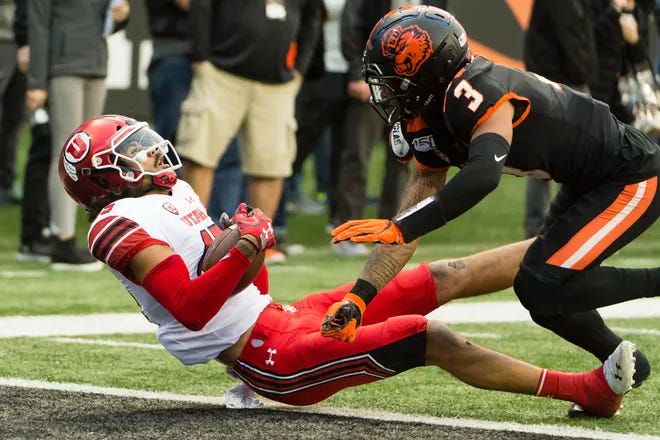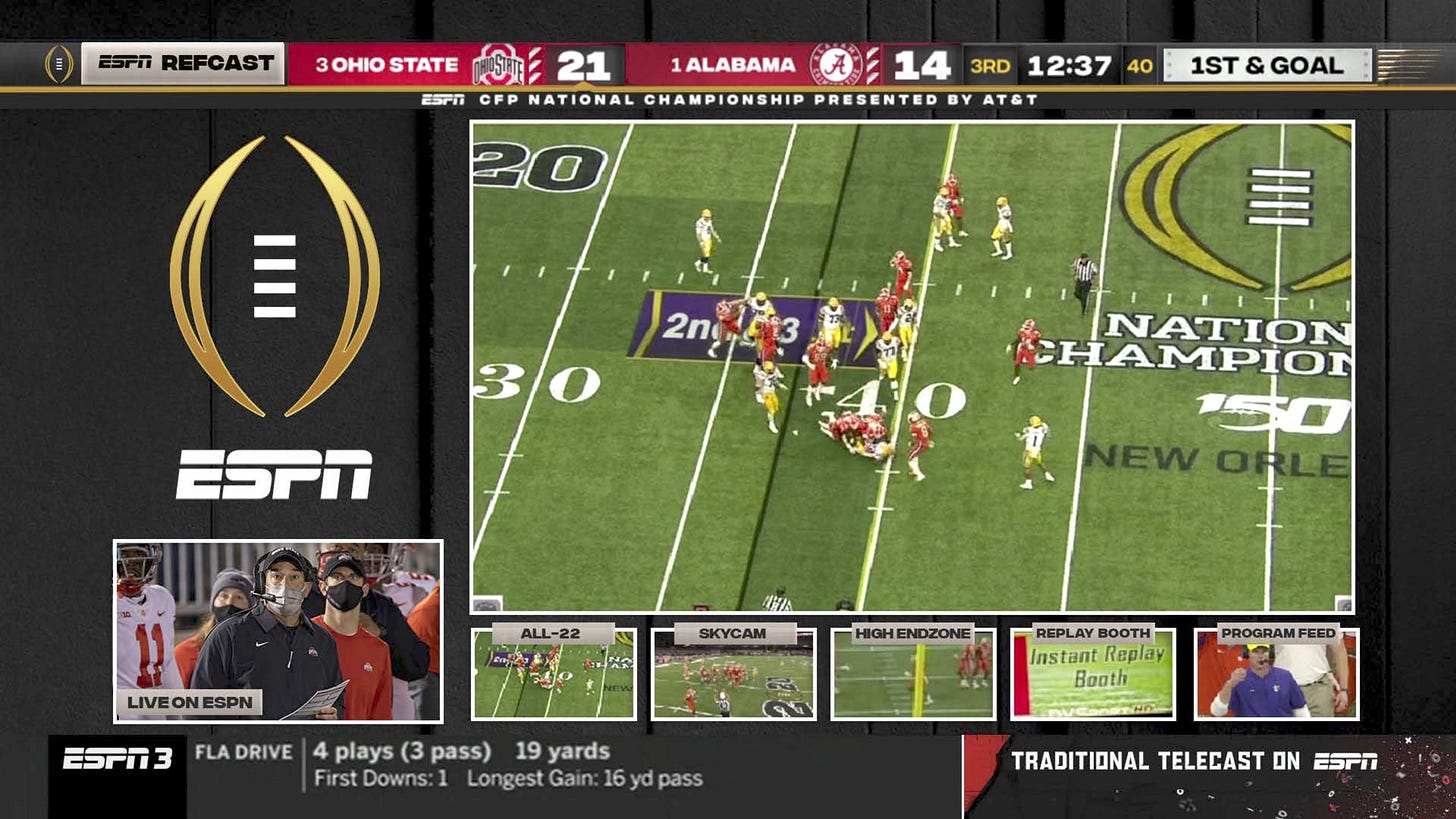Canzano: Geeking out on the media value of Pac-12 schools
What are the members really worth?
I’m not a media-rights expert. I’ve never negotiated a television contract. But Bob Thompson, the former Fox Sports Networks president, has done hundreds of deals over the years.
He’s the expert.
The Pac-12 Conference is currently negotiating with ESPN and some others for its next media-rights deal. A few weeks ago, I asked Thompson to take a look at the Pac-12 and reverse-engineer some media-rights valuations for the remaining 10 members.
Thompson geeked out on the numbers and created a formula to measure market size, television households, football brand, win percentage, Olympic sports, fan support, and men’s basketball impact.
Here’s his ranking:
The figures above are estimated “Year No. 1” numbers based on a five-year media rights contract with an average annual payout of $350 million. It includes an industry-standard four-percent annual increase and assumes the conference will be able to monetize the Pac-12 Networks.
The average payout in the first year: $32.4 million per school.
Can any of us really blame USC and UCLA for chasing what we now know will be a $72 million-a-year media rights payout in the Big Ten? A USC athletic department staff member told me, “Every AD in the Pac-12 would’ve made this move if they’re honest with you.”
The source also said that the Pac-12 never asked the Trojans and Bruins how they felt about the conference’s equal-revenue sharing philosophy.
“Nobody asked, ‘Are you OK with it? Would we like to see something different next contract?’ Not one conversation with LA schools, that was a mistake,” the source said.
For the sake of this discussion, let’s assume the conference won’t make that mistake again. Thompson provided a tiered estimate for the remaining 10 members of the conference. If the Pac-12 decides to explore unequal media-rights revenue sharing in this cycle, here’s how the ex-Fox executive sees it breaking down:
I’m told the conference members are discussing whether Pac-12 schools that earn postseason windfalls (College Football Playoff, NCAA Tournament, bowl games, etc.) should get to keep a larger share of those payouts. The conference members currently pool the postseason money and share equally. I think that’s going to change. But — would some of the Pac-12 schools also demand more media-rights money?
It’s not something the Ducks — or anyone else — have been advocating for in open sessions, per a well-placed Pac-12 source. But if we’ve learned anything in the last couple of months, it’s that college athletics has left the traditional subsidization model in the rearview mirror.
SPEAKING OUT: I talked with a couple of Pac-12 Conference athletic directors who said they were thrilled that ESPN executive Burke Magnus is talking.
ESPN is in negotiations with the Pac-12 for the conference’s media rights packages and could end up with the entire conference on its own. I was told by a Pac-12 insider that the discussions continue to be “productive.” But it was highly unusual — and refreshing — to hear one of the involved parties speak publicly, on the record, about what he’s thinking.
“Him talking like that, I think, helped the conference,” said one South Division Pac-12 athletic director.
Magnus, the president of programming for ESPN, appeared on a podcast with New York Post sports-media columnist Andrew Marchand and John Ourand of Sports Business Journal.
He didn’t talk about the imminent splintering of the Pac-12 or Big 12 Conference. Instead, the ESPN executive appeared to support the health and preservation of the college football eco-system. It should help settle down some of the “gloom-droids” and “doom-bots” out there. In fact, when he spoke about Pac-12 expansion, Magnus did so as if it were a foregone conclusion.
He said: “I don’t think anybody believes the Pac-12 will stay at 10, necessarily, but we don’t need to know anything beyond, ‘These are the 10, these are the rights, here’s the value, and there will be a mechanism to account for any new members if that is to happen.’”
I asked Bob Thompson, the aforementioned Fox Sports Networks head, what he made of Magnus’ comments and ESPN’s potential strategy.
Said Thompson: “He knows if they pluck a couple of Mountain West Conference teams and they end up with the Pac-12 on their own that it’s going to be tough for Fox and CBS to have any meaningful MWC primetime windows.”
Adding San Diego State to the Pac-12 would replace a small piece of the Southern California divot left by the defection of USC and UCLA. The Aztecs are worth about 1.1 million TV households. Thompson also mentioned Boise State and UNLV as possible targets.
“It would cut another two teams out of the inventory on the West Coast,” he said.
Fox and CBS currently share the Mountain West Conference inventory. CBS would still have control of the conference title game and, possibly, some Fresno State games, but it would be a significant geographic strategy play by ESPN.
The half dozen or so Pac-12 athletic directors I am talking with are split on whether adding a couple of Mountain West Conference programs is the right move. Some of them believe it would add value. Others think the conference should be more ambitious and pursue a few higher-profile candidates in the Big 12.
“Expansion is still there for us,” said one South Division Pac-12 AD. “We need to figure out where we are. I do believe that more members could bring strength but they have to be the right members.”
Thank you for reading. I appreciate all who have supported, subscribed and shared my new independent endeavor with friends and family. It means a lot. Your support is fueling what you read here. If you haven’t already — please consider subscribing.






The USC athletic dept source was a bit arrogant and childish. I mean, communication works in both directions, so if the unequal split was such a huge deal to them, maybe they should have made a proposal to Kliavkoff. It’s like a spouse saying, “Sorry you couldn’t read my mind, I’m outta here.”
To just run off without trying to find a solution tells me they had done the math and knew there was no way the PAC could come close, so they didn’t even bother asking. In that case, just own that you are making a mercenary move and don’t try to blame the conference.
I can see the logic behind unequal revenue splits, but man that's a hard one. OTOH, if you're OSU or WSU is taking less worth it to keep the conference intact? However, letting the school that earned it keep a larger share of the post season revenue is a no-brainer to me.